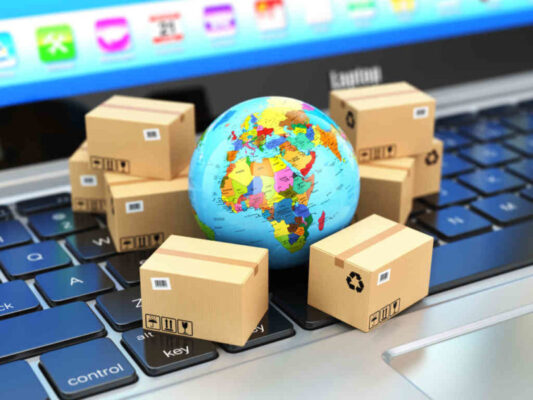
How Technology Change the eCommerce Logistics
Last updated on June 23rd, 2022 at 04:30 am
From office work to the daily chores, almost everything involves the usage of technology. The field of logistics is also becoming dependent on the internet and technology. E-commerce business is expected to grow to 4.9 trillion dollars by 2021 and in the logistics sector, it is predicted that the business will grow to USD 81.78 billion by 2023. New start-ups in the commercial and business sectors, tariff wars and restrictions, and with the rising market of China, the competition is bound to increase. To stay ahead in the market, it will be necessary to incorporate technology in the e-commerce logistics business. E-commerce retailers usually have to interact with millions of customers every day and the services must be given to the customers without any delay and in the best possible manner. Technology can have a major impact on this industry. The incorporation of technology can change and improve the e-commerce logistics industry.
Artificial Intelligence Automation
AI has taken control of almost all aspects of our lives. The trend of AI in e-commerce is not new. Google recently purchased an artificial intelligence company and other big firms like Facebook, Yahoo, etc have put their focus on AI to boost their business. Various studies suggest that in the coming years, through e-commerce, more than 80% of the customer interaction will be done without humans. The e-commerce businesses have already been using AI in:
- For better customer services
- For generating new leads
- For analyzing customer behavior and sales
Let’s see how it helps in the above-mentioned fields:
Focus on Customer
With the assistance of image and video recognition, AI utilizes language processing to limit the search for online shoppers. Smart applications learn to analyze the customer’s choices to contextualize the product search by automatically tagging and organizing content based on the image or video. The innovative search capabilities can enable a customer to look for related products easily. Whether the customer’s focus is on moving a small product like a mobile or on moving a car from one country to another, the related search pages will show up on the search suggestion list.
Trace the Potential Shoppers
Predictive marketing offers solutions to many of the sales’ problems. The ability of AI to analyze data faster and more efficiently than humans can give data related to the customers and their choices. For example, Getty images developed software to trace the web pages having the product visuals of its competitors.
Efficient Sales Process
Integrating AI in CRM could help understand their consumers better. Through voice input technology, AI analyzes customers’ preferences by asking certain questions. The software then scans hundreds of products to find the closest match of the desired product.
Personalization
Though it’s not new, still so much more can be achieved by exploring more features of personalization. With a multichannel approach, AI helps Businesses analyze through multiple touch-points how customers interact online.
Use of chat-bots
For a better customer experience on an individual level, e-commerce retailers are adopting conversational commerce. With AI, the application of chatbots has improved customer services by driving ways of conversation without requiring human assistance. It is slowly becoming a norm and shortly, online customer service on various social websites would become impossible without it for running an online business.
Virtual Assistance
For assisting customers online, AI has already introduced technologies like Siri, Alexa, etc. These technologies incorporated in the E-commerce logistics would help interpret and convert customers’ voices and messages into words or text thus, enhancing the customer experience.
AI can also improve recommendations for customers and can be integrated into everyday use.
IoT in E-Commerce Logistics
With the craze of social media websites and the intense human dependence on the internet, the importance and usage of smartphones have risen up. Smartphones are playing an important role in e-commerce logistics these days as IoT can enable the customers to search and buy any product from anywhere in the world at any time. This, in turn, raises the expectations of customers regarding the delivery of the product. According to studies, IoT can make supply chain operations in e-commerce:
- Faster
- Cheaper
- Better
New ways are being explored to improve the speed of deliveries using IoT with the hopes to digitize the whole process of supply chain management including the automation of vehicles, inventories and, the flow of information and products.
Digitization
The best example to explain the digital transformation of the major e-commerce logistics firms is that of Alibaba. Its digital infrastructure can support more than 0.3 million orders per second. Moreover, it is ensured that the customers do get their deliveries and that too on time so the customers keep coming back.
For transparent and secure transportation of the products, IoT provides accurate and clean data about the various steps in the supply chain by tracking all the information about the product. Blockchain records all the data accurately and any changes made to it are also shared with all the involved parties. Hence, there are no chances of fraud or counterfeiting and the whole process becomes transparent. IOT’s ability to analyze data helps companies to work on proactive mechanisms and policies instead of the defensive ones to prevent any sort of delay, cancellation or extra cost.
Along with that, IoT based data structures can assist in:
Making inbound and outbound logistics operations at airports or seaports efficient
- Enhancing operations in the distribution centers
- Automation of transportation
- Ensuring security, the integrity of the company
- Managing cold chain
Analytics in Real-Time
By integrating the technology of Big Data and IoT in e-commerce logistics, real-time analytics can be obtained. It is a hard and complex job to operate large volumes of data. Manually, it sometimes becomes impossible to accurately and efficiently. Any mistakes or errors could lead to serious consequences too. To help prevent any kind of loss arising from information sprawl can be prevented by using the technology of Big Data and IoT. In e-commerce logistics, such technology identifies and marks the patterns and trends of sales, and at the same time predicts the efficiency of the company’s performance. These solutions mitigate the risks of fuel loss, any problem in the maintenance of the vehicle, etc.
Sales Forecasting
The companies can forecast their sales patterns with the help of smart software solutions. The data related to the sales predictions could help real-time in the stock limit to be installed in the inventory. This could help retailers save a lot of costs.
Filter out Fake News
Fake news is a huge problem in the e-commerce fields. Technological solutions have been proposed to filter the fake news and eradicate it.
Re-Target Potential Customers
These days, many companies are using facial recognition software to identify and trace the customers based on the time they spend searching for a specific product. The information is stored and the data is recorded for further recommendations. The data is used to enhance sales with the help of AI as it can re-market potential customers

Danielle Gregory is a full-time Writer, Traveler and Marketing Expert who is Currently Working for QAFILA. Danielle’s writing relates to a range of subjects such as logistics and IoT. Besides writing, she enjoys traveling, Cooking and Riding
